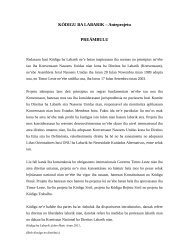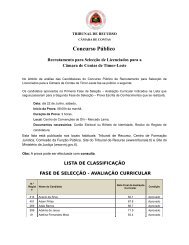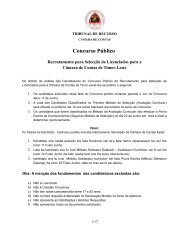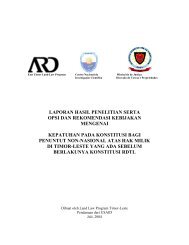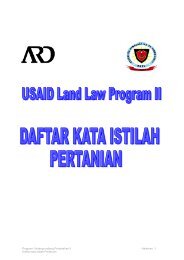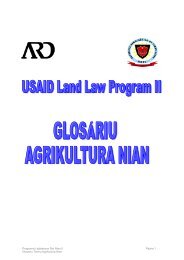English
English
English
Create successful ePaper yourself
Turn your PDF publications into a flip-book with our unique Google optimized e-Paper software.
Furthermore, European Court of Justice jurisprudence offers an apposite solution with respect to<br />
expropriation of the property of nationals. In one case against the government of the United Kingdom<br />
(1985), the applicants maintained that the system of leasehold enfranchisement had deprived them of their<br />
possessions without adequate compensation. They additionally argued that they were entitled to prompt,<br />
adequate and effective compensation in accordance with the general principles of international law<br />
referred to in Article 1 of the First Protocol of the European Charter for Human Rights. The court rejected<br />
these arguments on the grounds that this reference to international law does not apply to the state’s<br />
acquisition of the property of its own nationals, but is designed for the protection of aliens. The court<br />
reaffirmed this ruling in a similar case against the government of the United Kingdom (1986), which dealt<br />
with the nationalization of various industries. In addition, the court stated that under Article 1 of the First<br />
Protocol, the acquisition of property without payment of an amount reasonably related to its value would<br />
normally constitute a disproportionate interference, which could not be considered justifiable, but that<br />
Article 1 did not guarantee a right to full compensation in all circumstances, since legitimate objectives of<br />
“public interest,” such as measures aimed at economic reform, might call for less than full reimbursement.<br />
In so doing, the court drew a crucial distinction between compensation for the expropriation of nationals’<br />
assets and aliens’ assets, and furthermore brought to the fore the notion of just compensation being<br />
determined with due regard for both public interest and the interests of the expropriated individual. This<br />
train of thought is also followed by the South African Constitution with respect to compensation for<br />
expropriated property.<br />
4.2 COMPENSATION ACCORDING TO SOUTH AFRICAN AND<br />
COMPARATIVE CONSTITUTIONAL LAW<br />
Article 25 (3) of the South African Constitution stipulates that compensation for expropriated property<br />
must be “just and equitable” in its amount, timing and manner of payment. The formula was already<br />
considered by the Land Claims Court in Former Highlands. Ordinarily, according to foreign property<br />
rights jurisprudence, “just and equitable” compensation would mean market value compensation.<br />
Article 25 also indicates that compensation below market value or, conceivably, above market value, may<br />
in some circumstances be just and equitable and therefore constitutional. Article 25 (3) requires a<br />
balancing test between the public interest and the interests of those affected by the expropriation when<br />
calculating the amount of recompense for expropriation and thereby requires that account be taken of “all<br />
relevant factors,” including:<br />
a) the current use of the property;<br />
b) the history of the acquisition and use of the property;<br />
c) the market value of the property;<br />
d) the extent of direct state investment and subsidy in the acquisition and beneficial improvement of the<br />
property; and<br />
e) the purpose of the expropriation.<br />
Though the market value of the property concerned is only one of the criteria, the Land Claims Court<br />
pointed out that, apart from factor d), which deals with the extent of state investment and subsidy, market<br />
value is the only factor listed in Article 25 (3) that is objectively quantifiable. Once market value has been<br />
determined, the court can then attempt to strike an equitable balance between private and public interests.<br />
The interests of the expropriated party may raise the compensation to above market value. Similarly, the<br />
public interest may reduce the compensation to an amount which is below market value. The order of<br />
analysis, according to the Land Claims Court, is therefore first to determine the market value of the<br />
6 NON-CUSTOMARY PRIMARY INDUSTRY LAND SURVEY



